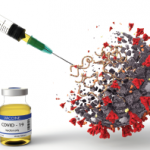Background & Objectives
Vaccinations against preventable diseases, including seasonal influenza, are strongly recommended for patients with rheumatoid arthritis (RA), who are at increased risk of infections as a result of underlying immune dysfunction and treatment-induced immunosuppression. However, methotrexate, a mainstay for the treatment of RA, significantly decreases the vaccine response to pneumococcal and seasonal influenza vaccines, particularly the response to antigens from novel strains.
Park et al. previously showed that temporarily discontinuing methotrexate for two weeks in RA patients who had been receiving a stable dose of methotrexate significantly increased immunogenicity without significantly increasing disease activity levels, whereas a four-week discontinuation was associated with a transient increase in the risk of RA flare, defined as an increase in the Disease Activity Score in 28 joints.
Park et al. conducted this clinical trial to investigate whether discontinuing methotrexate for one week after seasonal influenza vaccination is noninferior to discontinuing it for two weeks after vaccination in patients with RA.
Methods
In this multicenter, prospective, randomized, parallel-group noninferiority trial, patients with RA receiving a stable dose of methotrexate were randomly assigned at a ratio of 1:1 to discontinue methotrexate for one week or for two weeks after they received the quadrivalent 2021–2022 seasonal influenza vaccine containing H1N1, H3N2, B/Yamagata and B/Victoria strains. The primary outcome measure was the proportion of patients with a satisfactory vaccine response, which was defined as a fourfold or greater increase in antibody titers, as determined with the hemagglutination inhibition assay, against two or more of the four vaccine strains four weeks after vaccination.
Results
The modified intent-to-treat population included 90 patients in the one-week methotrexate hold group and 88 patients in the two-week methotrexate hold group. The mean ± SD methotrexate doses were 12.6 ± 3.4 mg/week in the one-week hold group and 12.9 ± 3.3 mg/week in the two-week hold group. The proportion of satisfactory vaccine responses did not differ between the groups (68.9% vs. 75.0%; P=0.364). The rate of seroprotection and the increase in antibody titers for each of the four influenza antigens were similar between groups. Over the four weeks following vaccination, 4.5% of patients in the one-week hold group and 12.9% of patients in the two-week hold group experienced an RA flare (P=0.05).
Conclusion
A temporary discontinuation of methotrexate for one week after vaccination was noninferior to a discontinuation of methotrexate for two weeks after vaccination for the induction of a satisfactory vaccine response to a seasonal influenza vaccine in patients with RA receiving a stable dose of methotrexate.


